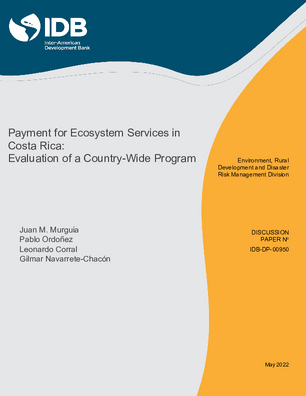Payment for Ecosystem Services in Costa Rica: Evaluation of a Country-wide Program
Date
May 2022
Several countries have implemented payment-for-ecosystem-services (PES) programs, buoyed by the promise of these programs as a win-win strategy that would allow both the conservation of natural resources, and the reduction of poverty for rural households and communities. Our study evaluates the effect on deforestation of Costa Rica's PES program, one of the oldest country-wide programs in the world. Costa Rica approved the 1996 Forest Law (Law No. 7575), creating a PES program that compensates landowners for forest conservation. We estimate these effects using an event study design with staggered entry into treatment. Our results show a statistically significant effect for the first year with a decrease in deforestation of 0.21 ha, but not for the following years. Given that the baseline level of deforestation in our sample is low, the magnitude of the effect is large. When compared to the pre-2016 average level of within farm deforestation, our estimated effect would imply a 100% reduction in deforestation for the first year after enrollment. Given the program pays the participants for a 5-year period, and that the effect is significant only during the first year, it may be beneficial for the program to reduce its length and implement required simplified annual contract renewals or other behavioral interventions to reduce noncompliance in subsequent years.




